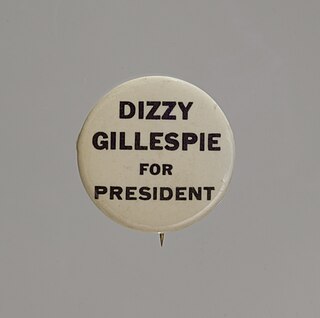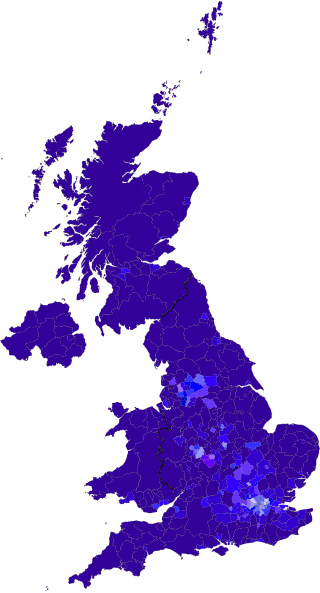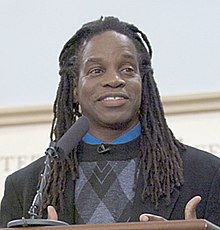Racism is discrimination and prejudice against people based on their race or ethnicity. Racism can be present in social actions, practices, or political systems that support the expression of prejudice or aversion in discriminatory practices. The ideology underlying racist practices often assumes that humans can be subdivided into distinct groups that are different in their social behavior and innate capacities and that can be ranked as inferior or superior. Racist ideology can become manifest in many aspects of social life. Associated social actions may include nativism, xenophobia, otherness, segregation, hierarchical ranking, supremacism, and related social phenomena.
White supremacy is the belief that white people are superior to those of other races and thus should dominate them. The belief favors the maintenance and defense of any power and privilege held by white people. White supremacy has roots in the now-discredited doctrine of scientific racism and was a key justification for European colonialism.

Timothy Jacob Wise is an American activist and writer on the topic of race. He is a consultant who provides anti-racism lectures to institutions.
White privilege, or white skin privilege, is the societal privilege that benefits white people over non-white people in some societies, particularly if they are otherwise under the same social, political, or economic circumstances. With roots in European colonialism and imperialism, and the Atlantic slave trade, white privilege has developed in circumstances that have broadly sought to protect white racial privileges, various national citizenships, and other rights or special benefits.
Critical race theory (CRT) is an interdisciplinary academic field focused on the relationships between social conceptions of race and ethnicity, social and political laws, and media. CRT also considers racism to be systemic in various laws and rules, and not only based on individuals' prejudices. The word critical in the name is an academic reference to critical theory rather than criticizing or blaming individuals.
Racism has been reflected in discriminatory laws, practices, and actions against "racial" or ethnic groups throughout the history of the United States. Since the early colonial era, White Americans have generally enjoyed legally or socially sanctioned privileges and rights which have been denied to members of various ethnic or minority groups at various times. European Americans have enjoyed advantages in matters of education, immigration, voting rights, citizenship, land acquisition, and criminal procedure.

Edmund Dene Morel was a French-born British journalist, author, pacifist and politician.
Black conservatism is a political and social philosophy rooted in communities of African descent that aligns largely with the conservative ideology around the world. Black conservatives emphasize traditionalism, patriotism, self-sufficiency, and strong cultural and social conservatism within the context of the black church. In the United States it is often, but not exclusively, associated with the Republican Party.
Reverse racism, sometimes referred to as reverse discrimination, is the concept that affirmative action and similar color-conscious programs for redressing racial inequality are forms of anti-white racism. The concept is often associated with conservative social movements and reflects a belief that social and economic gains by Black people and other people of color cause disadvantages for white people.

Joe Richard Feagin is an American sociologist and social theorist who has conducted extensive research on racial and gender issues in the United States. He is currently the Ella C. McFadden Distinguished Professor at Texas A&M University. Feagin has previously taught at the University of Massachusetts, Boston, University of California, Riverside, University of Texas at Austin, and the University of Florida.
While black people in Nazi Germany were never subject to an organized mass extermination program, as in the cases of Jews, homosexuals, Romani, and Slavs, they were still considered by the Nazis to be an inferior race and along with Romani people were subject to the Nuremberg Laws under a supplementary decree. There is evidence that at least two dozen black Germans ended up in concentration camps in Germany.
Racism in Cuba refers to racial discrimination in Cuba. In Cuba, dark skinned Afro-Cubans are the only group on the island referred to as black while lighter skinned, mixed race, Afro-Cuban mulattos are often not characterized as fully black or fully white. Race conceptions in Cuba are unique because of its long history of racial mixing and appeals to a "raceless" society. The Cuban census reports that 65% of the population is white while foreign figures report an estimate of the number of whites at anywhere from 40 to 45 percent. This is likely due to the self-identifying mulattos who are sometimes designated officially as white. A common myth in Cuba is that every Cuban has at least some African ancestry, influenced by historical mestizaje nationalism. Given the high number of immigrants from Europe in the 20th century, this is far from true. Several pivotal events have impacted race relations on the island. Using the historic race-blind nationalism first established around the time of independence, Cuba has navigated the abolition of slavery, the suppression of black clubs and political parties, the revolution and its aftermath, and the special period.

The sociology of race and ethnic relations is the study of social, political, and economic relations between races and ethnicities at all levels of society. This area encompasses the study of systemic racism, like residential segregation and other complex social processes between different racial and ethnic groups.

Race relations is a sociological concept that emerged in Chicago in connection with the work of sociologist Robert E. Park and the Chicago race riot of 1919. Race relations designates a paradigm or field in sociology and a legal concept in the United Kingdom. As a sociological field, race relations attempts to explain how racial groups relate to each other. These relations vary depending on historical, social, and cultural context. The term is used in a generic way to designate race related interactions, dynamics, and issues.

The Black History of the White House is a book by Clarence Lusane concerning the history of the African-American community's relationship to government and the White House as a symbol as well as a place of employment. The book begins with the founding of the United States and continues to the first few years of the Barack Obama administration.
Kwame Dixon is a political scientist and human rights activist who specializes on race in the Americas. His field of interest is in African descendant people living in Latin America, North America and South America. He is a professor of Afro-Latino Studies, Race, Democracy and Human Rights for Afro-Latin Americans. He currently works at Howard University as a professor in the department of African American Studies. He contributes articles to The Hemispheric Institute E-misférica, He is also a consultant for NGO's like Consultant – Club of Madrid Expert: African Women's Leadership Project.

On October 16, 1901, shortly after moving into the White House, President Theodore Roosevelt invited his adviser, the African American spokesman Booker T. Washington, to dine with him and his family. The event provoked an outpouring of condemnation from white politicians and press in the American South. This reaction affected subsequent White House practice and no other African American was invited to dinner for almost thirty years.
Racial biases are a form of implicit bias, which refers to the attitudes or stereotypes that affect an individual's understanding, actions, and decisions in an unconscious manner. These biases, which encompass unfavorable assessments, are often activated involuntarily and without the awareness or intentional control of the individual. Residing deep in the subconscious, these biases are different from known biases that individuals may choose to conceal for the purposes of social and/or political correctness. Police officers have implicit bias, regardless of their ethnicity. Racial bias in criminal news reporting in the United States is a manifestation of this bias.

The jazz musician Dizzy Gillespie campaigned as an independent write-in candidate during the 1964 United States presidential campaign.

White people in the United Kingdom are a multi-ethnic group of UK residents who identify as and are perceived to be 'white people'. White people constitute the historical and current majority of the people living in the United Kingdom, with 87.2% of the population identifying as white in the 2011 United Kingdom census.










